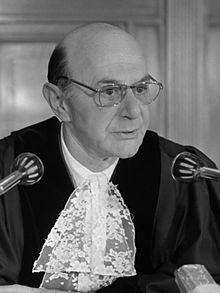Manfred Lachs: Difference between revisions
| Line 20: | Line 20: | ||
* [https://web.archive.org/web/20101204051702/http://www.iss.nl/About-ISS/History/Honorary-Fellows Profile at The International Institute of Social Studies] (ISS) |
* [https://web.archive.org/web/20101204051702/http://www.iss.nl/About-ISS/History/Honorary-Fellows Profile at The International Institute of Social Studies] (ISS) |
||
==External links== |
==External links== |
||
* {{cite journal |author= The Associated Press |title= Manfred Lachs, World Court Judge, 77 |journal= The New York Times |date= January 15, 1993 |url= https://www.nytimes.com/1993/01/15/obituaries/manfred-lachs-world-court-judge-77.html|accessdate= November 9, 2020}} |
|||
* {{Internet Archive author |sname= Manfred Lachs}} |
* {{Internet Archive author |sname= Manfred Lachs}} |
||
{{Authority control}} |
{{Authority control}} |
||
Revision as of 11:34, 9 November 2020

Manfred H. Lachs (April 21, 1914 in Stanislav, Austrian Galicia – January 14, 1993 in Den Haag) was a Polish diplomat, Judge on the International Court of Justice, and jurist who greatly influenced the development of international law after World War II.
Life
Lachs attended the Cracow Jagiellonian University where he earned a doctorate in Laws (1937). Right after his studies, he started working for the Consular Academy of Vienna and afterwards in the London School of Economics. Lachs was drafted in the army and throughout his military service he was advisor to the Polish government.
Before his career turned toward international laws, he filled many judiciary posts in the Polish government such as Poland's Foreign Affairs director of the Department of treaties and legal jurisdiction (1947–1960) and prime minister's special advisor (1960–1967). During the Paris' Peace conference of 1946, Lachs stood for his country as a delegate. He later became a professor of international law at the University of Warsaw (1952–1993), and served as a member of the Polish delegation of the general assembly of the United Nations.
Afterwards, Lachs became a judge on the International Court of Justice, and eventually became one of the longest-serving judges there, working from 1967 until 1993, and presiding it from 1973 to 1976. He wrote The Law of Outer Space: An Experience in Contemporary Law Making in 1972, and the Teacher in International Law is 1982.
The International Institute of Social Studies (ISS) awarded its Honorary Fellowship 1982. Member Honoris Causa of The Mexican Academy of International Law.
Manfred Lachs Moot Court Competition
After his death, the Manfred Lachs Space Law Moot Competition[1] was named in his honour by the International Institute of Space Law.
References
- "M. Lachs (1914-1993)". Peace Palace Library. Archived from the original on 2007-09-27. Retrieved 2006-10-05.
- "Lachs, Manfred". Encyclopædia Britannica. Retrieved 2006-10-05.
- Profile at The International Institute of Social Studies (ISS)
External links
- The Associated Press (January 15, 1993). "Manfred Lachs, World Court Judge, 77". The New York Times. Retrieved November 9, 2020.
- Works by or about Manfred Lachs at Internet Archive
- 1914 births
- 1993 deaths
- Jews from Galicia (Eastern Europe)
- Polish Jews
- Polish diplomats
- Alumni of the London School of Economics
- International law scholars
- International Law Commission officials
- People from Ivano-Frankivsk
- Presidents of the International Court of Justice
- Polish judges
- Polish judges of United Nations courts and tribunals
